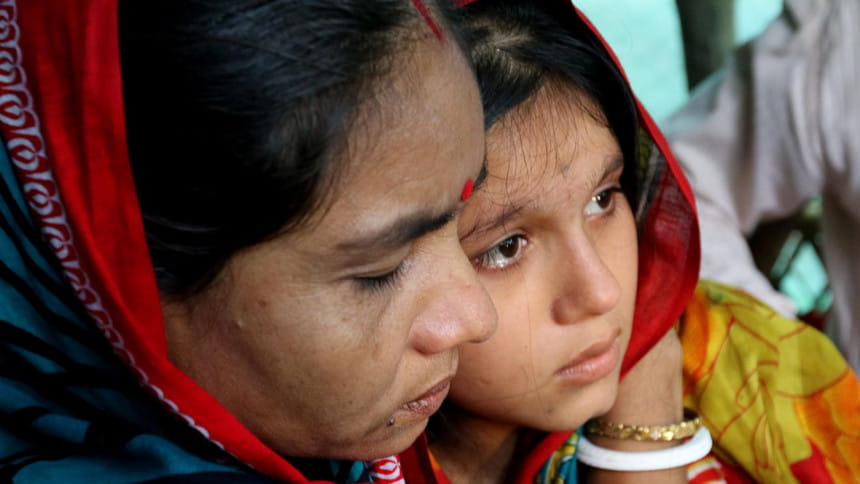From a high moral ground to a high legal perch

That Bangladesh offered a safe haven to close to a million Rohingya refugees fleeing wholesale persecution from Myanmar put Dhaka on a high moral pedestal. Bangladesh's humanitarian position got her accolades, even though moral and material support fell short of exerting any effective pressure on Myanmar to take back their abandoned nationals.
All that was, in fact, soured by a certain resigned attitude of the regional/international players that the refugees are there in Bangladesh for the long haul. Countries with levers to press on Myanmar to behave in a civilised, responsible manner chose not to, pampering the junta to a point of being a perpetual regional bully boy!
It is time for the international legal system to end the impunity culture of the recalcitrant Burmese regime. For this to happen, the Rome Statute, the bed-rock of the International Criminal Court (ICC), is going to be invoked at long last.
Presumably, it has the stamp of the use of motu proprio power by the ICC to investigate the crimes in question. The ICC has taken up the matter of its own volition realising its gravity—there was no UNSC referral nor any move that we know of from the Bangladesh side with the ICC.
Needless to say, the ICC initiative presents Bangladesh, a party to the Rome Statute, with an opportunity to hold Myanmar to account through international legal means.
With that hopefully in prospect, Bangladesh will be poised to move from the high moral ground to the high legal ground.
The preamble to the Rome Statute affirmed that "the most serious crimes of concern to the international community as a whole must not go unpunished" and there should be determination "to put an end to impunity for the perpetrators and thus to contribute to prevention of such crimes."
The procedure followed in a bid to invoke the Rome Statute which repudiates "deportation or forcible transfer of population" as crime against humanity is as meticulous as it is fair. As a first step, the ICC Prosecutor Fatou Bensouda asked the court to rule on whether it has jurisdiction over the matter. Then, the ICC pre-trial chamber, on May 7, invited Bangladesh to submit written observations by June 11 on whether the court can exercise jurisdiction over forced deportation of Rohingyas from Myanmar to Bangladesh.
Usually one would have expected—since Myanmar triggered a wholesale exodus—she would be the first to be approached by the court to elicit her opinion on its culpability. But this was not to be because Myanmar is not a state party to the Rome Statute. All the more reason though to subject Myanmar to an ICC investigation. This brings to the fore the compelling necessity for the ICC to gather all information on atrocities before bringing them up to the offending party to establish its guilt. Bangladesh being a repository of evidence deserves to be the first port of call for the ICC as procedural requirement.
Barrister Manzoor Hasan in these columns on Tuesday put the matter of territorial jurisdiction succinctly: "According to the Rome Statute, territorial jurisdiction is not limited to the place where the coercive acts took place, Myanmar in this case, but to all states involved in the deportation across the international border, concluding at the receiving state, Bangladesh in this case."
There are three valid reasons for Bangladesh to respond to the pre-trial chamber's letter seeking her opinion on the ICC proposing exercise of jurisdiction over deportation of Rohingyas from Myanmar to Bangladesh: First, as the unfortunate receptacle of the fall-out of Myanmar's despicable waves of ethnic cleansing; and secondly, as a signatory to the Rome Statute.
Lastly, our own history prods us to demand justice; we suffered from war crimes and brought those responsible to justice, a legacy worth replicating as template to combat the sinister side to human affairs.
Even the states within the ICC which are not party to the Rome Statute—USA, China and Russia—can play a major role in ICC investigations. "They can ensure the ICC to act or prevent countries from cooperation with it." Again, the ball rolls into the court of super-powers to act in favour of the aggrieved party.
The UNSC used the ICC as a diplomatic instrument to deal with the crisis in Sudan. Three out of five permanent members of the UNSC are not party to the Rome Statute, including the USA. But Washington has been making the right noises for Bangladesh on Rohingya crisis in so many ways. Would the US and India help Bangladesh come out of the repatriation tunnel closed on the receiving side?
The overarching signal we need to put across is a carefully calibrated response in particular to the humanitarian part of the challenge. We need to refrain from conveying a sense of semi-permanence, let alone permanence in our approach to the Rohingya rehabilitation issues. As it is, going by Myanmar's present indication of an intake of 300 refugees per day, the repatriation process will take up to eight years. But not even a stuttering start has been made yet! Indeed, are we looking for a messiah in the international community not to allow us to be condemned to a long haul?
Shah Husain Imam is adjunct faculty at East West University, a commentator on current affairs and former Associate Editor, The Daily Star.
Email: [email protected]

 For all latest news, follow The Daily Star's Google News channel.
For all latest news, follow The Daily Star's Google News channel. 



Comments